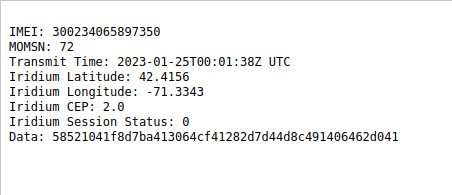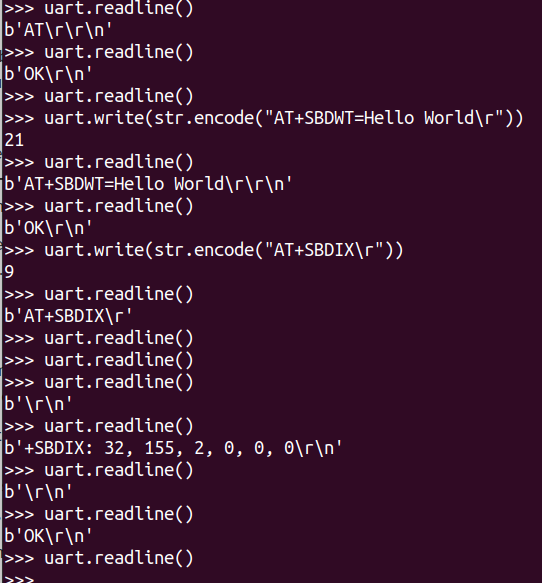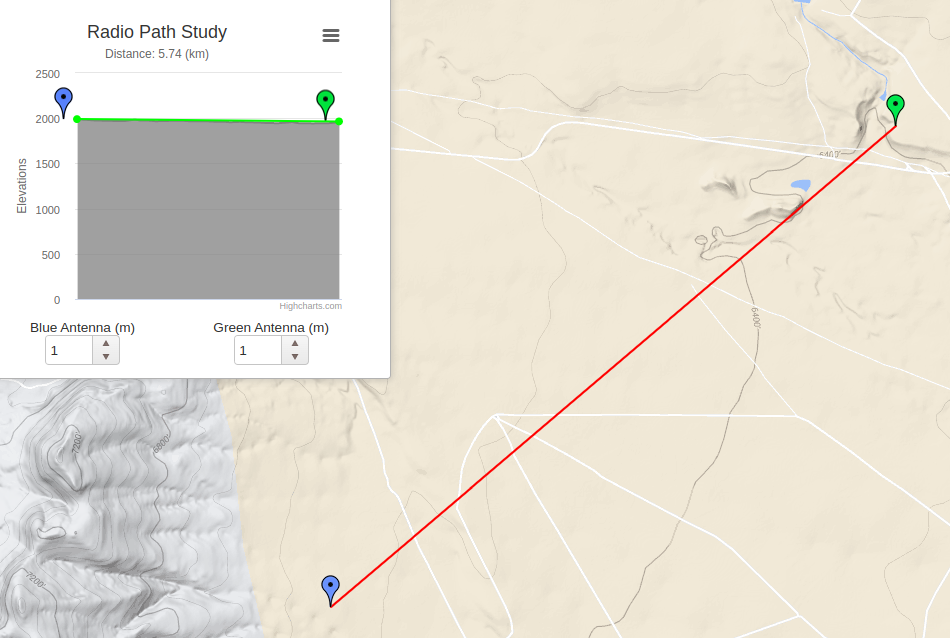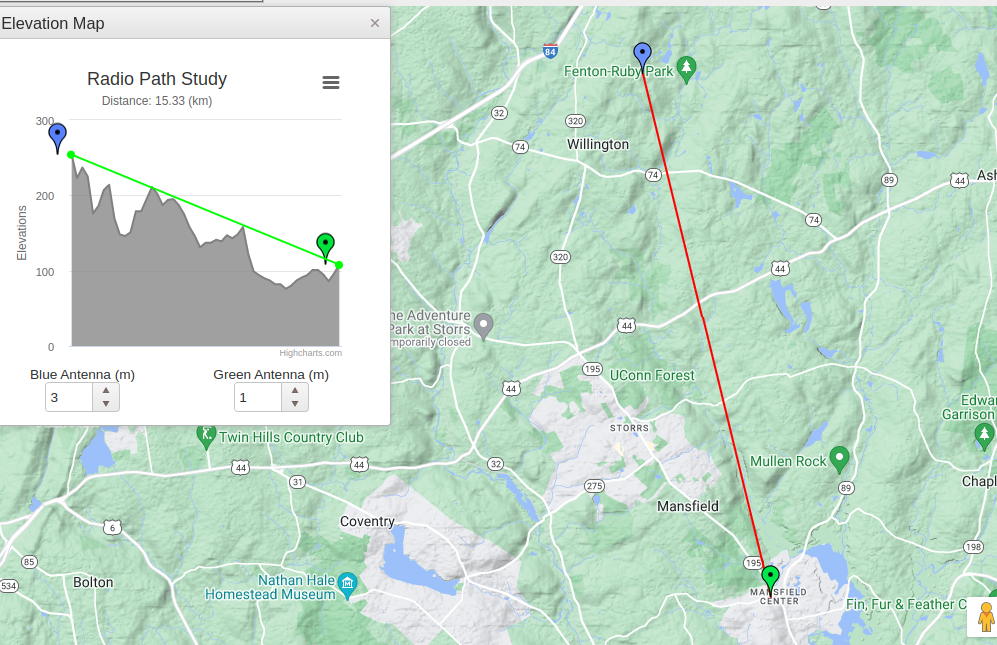Edge Collective
Initial technical notes
Some initial technical notes on the water storage monitoring project.Working with CPy 7 on Feather Blue Sense for now ...
Guide https://learn.adafruit.com/using-the-rockblock-iridium-modem?view=all#circuitpython-example
Rockblock Circuitpython library https://github.com/adafruit/Adafruit_CircuitPython_RockBlock
Library documentation https://docs.circuitpython.org/projects/rockblock/en/latest/api.html
ESP32-S2 TFT
Guide https://learn.adafruit.com/adafruit-esp32-s2-tft-feather/circuitpython
Adding an additional serial port to the Feather S2
Maxbotix
Guide for maxbotic sensors: https://www.maxbotix.com/tutorials.htm
Sensor output options: https://www.maxbotix.com/tutorials2/sensor-output-options.htm
1-wire sensor
Guide to Circuitpython here
Using CPY 7.X on the Feather Bluefruit Sense for now

Message 75 and 76 are in the format:
data = struct.pack("f",batt_voltage)
data += struct.pack("f",depth_inches)
data += struct.pack("2f", sht.relative_humidity, sht.temperature)
data += struct.pack("2f", bmp.pressure, bmp.temperature)
E.g. Message 75:
IMEI: 300234065897350
MOMSN: 75
Transmit Time: 2023-01-25T00:36:18Z UTC
Iridium Latitude: 42.4393
Iridium Longitude: -70.7191
Iridium CEP: 544.0
Iridium Session Status: 2
Data: 982f854090673f43bc35bb410028cf4188577d44646ccf41
Example python3 code for decoding:
>>> data=bytes.fromhex("982f854090673f43bc35bb410028cf4188577d44646ccf41")
>>> struct.unpack("<6f", data)
(4.162059783935547, 191.404541015625, 23.40123748779297, 25.89453125, 1013.36767578125, 25.92792510986328)
Initial version of satellite modem that sends depth and sensor data, waits 1 minute in between:
Looks as though it's 1 credit per message.
The highest rate is 0.145 British Pounds per credit for 100 credits (.099 BP per credit when buying 1000 credits).
So that's a purchase of $17.86 for 100 credits ($.18 per credits); or $121.94 for 1000 credits ($.12 per credit)
We might be able to pack more data in per message ... i.e., we could perhaps send several hours' worth of data once per day ...
But let's say we want to send one message per day. That's one credit per day.
So, 30 credits per month.
The line rental is $16 per month.
That's $5.40 per month for the messages, and $16 per month for the line rental -- so, that's about $22 per month
Decoding python structs using javascript
https://www.thethingsnetwork.org/forum/t/payload-formats-howto/3441/3
Better: a nodejs package python-struct: https://www.npmjs.com/package/python-struct
Or alternatively: https://github.com/lyngklip/structjs which seems to include easy to use source code ...
Using python-struct ...
Better link? https://stackoverflow.com/questions/5605108/pack-unpack-functions-for-node-js
Working code using structjs:
Gist: https://gist.github.com/dwblair/cc651bcb3bd11f13840c074c80bd924b
Structjs: https://github.com/lyngklip/structjs
Working repository (needed to make it a 'type':'module' ... ?): https://github.com/dwblair/js-python-struct-converter
Sending / relaying data on server / rock7 side
rockblock webhooks: https://docs.rockblock.rock7.com/docs/integration-with-application
Data compression for rockblock
Suggestions on compressing data for the rockblock https://docs.rockblock.rock7.com/docs/compressing-your-data
Adaptive retry for rockblock
https://docs.rockblock.rock7.com/docs/adaptive-retry
Rockblock Credit System
Credits are used each time you transmit. 1 credit is used per 50 bytes (or part thereof) of message sent or received. 1 credit is also used if you check your mailbox and there are no messages waiting (A mailbox check). Credits do not expire unless you do not use your account at all for 12 months. Credits are shared/pooled between all of the devices on your account
https://docs.rockblock.rock7.com/docs/iridium-contract-costs
Rockblock is sending depth data, pulling readings from analog pin on the depth sensor. The Circuipython firmware is v 7.X, and is from here: https://github.com/dwblair/rockblock-ultrasonic/tree/main/firmware/v1
The rockblock sends it data to the rockblock server, which has a 'webhook' that sends an HTTP POST JSON of data to 159.65.226.222:4000
The firmware on the rockblock encodes its data using a python struct approach
A 'relay server' is running at 159.65.226.222:4000, using code from here: https://github.com/edgecollective/iridium-bayou-relay. The relay server decodes the data using a js version of the python struct approach, and then does an HTTP POST of the data to bayou.pvos.org at the '2ifhwi34ue4j' data feed
Sleep stats for Feather S2: https://learn.adafruit.com/adafruit-esp32-feather-v2/power-management
Smaller sharp display (adafruit product) -- https://www.digikey.com/en/products/detail/adafruit-industries-llc/3502/7386264
Larger sharp display: https://www.digikey.com/en/products/detail/sharp-microelectronics/LS013B7DH03/5300387
Sharp memory family https://www.mouser.com/datasheet/2/365/Sharp_Memory_LCD_Brochure_2015-746065.pdf
Wed Mar 8 06:00:46 PM EST 2023
Sleep mode in Feather ESP32 S2 TFT
https://learn.adafruit.com/deep-sleep-with-circuitpython/power-consumption
Seems like we get less than 0.1 mA in deep sleep!
Maxbotix 7092 datasheet: /img/ojofeliz/PD11838z_-XL-MaxSonar-WR_Datasheet-website.pdf
Notes:
Feather ESP32 S2 seems like a good chip to use.
Sleep current will likely be dictated by the ultrasonic sensor module.
Datasheet suggests that average current for module is 2 mA. We might be able to turn on/off, too.
First order: don't worry about turning off ultrasonic. Solar charging will likely provide ample energy.
First pass: looks like Feather S2 doesn't like talking to its uart?

Looks like there is a delay in response to the SBDIX command
Added a delay in adafruit_rockblock.py when sending that command!
Also note: reference /gitwork/rockblock-ultrasonic/firmware/v2 for model code that was working on the nrf
Fri Mar 10 10:22:56 AM EST 2023
selecting a fluid level sensor https://www.digikey.com/en/articles/selecting-a-fluid-level-sensor-what-you-need-to-know
PVC float switch: https://www.digikey.com/en/products/detail/LS01-1A66-PA-500W/374-1000-ND/385414 -- $14
Optomax liquid level detector -- $25 -- https://www.adafruit.com/product/3397?gclid=Cj0KCQiAx6ugBhCcARIsAGNmMbg3aIRxX2yRx9D1Ut7yRgv7RB8RR9syOGakpW9teGRHD29flF-9ktoaAk5bEALw_wcB
Sparkfun project to turn a pump on/off on a farm -- https://learn.sparkfun.com/tutorials/photon-remote-water-level-sensor/all
SAM-M8Q-0 GPS (with antenna) https://www.digikey.com/en/products/detail/u-blox/SAM-M8Q-0/7393574
Pinouts on ESP32-S2 TFT
https://learn.adafruit.com/assets/109051
RFM95 in Circuitpython https://github.com/adafruit/Adafruit_CircuitPython_RFM9x
mesh lora https://github.com/bsppbep/mesh_lora
transmit an image via rfm95 https://github.com/jerryneedell/mlx90640_rfm9x
experimenting with feather m0 lora memory https://github.com/jerryneedell/feather_m0_rfm9x_memory
spi bus error: https://github.com/adafruit/circuitpython/issues/7304
combo:
adafruit i2c gps, with circuipython support: https://www.adafruit.com/product/4415
i2c precision altitude: https://www.adafruit.com/product/4494
feather esp32 s2 tft
and radio modules ... (do i have them?)
and batteries
sam m8q featherwing https://hackaday.io/project/168430-u-blox-sam-m8q-gps-featherwing
North Jahren solar well 35.98789907447341, -104.8167669015538
South HQ solar well 35.98751529327594, -104.81660879964933
Jarosa Camp 36.02089727268662, -104.7680715149748
line of sight calculator https://www.scadacore.com/tools/rf-path/rf-line-of-sight/

Connecticut circuitpython lora mesh test
treehouse: 41.898891720871454, -72.24480179618855
stenta: 41.76515928573123, -72.20066097255132

Mar 14 2023
Calculating an elevation between two points: https://stackoverflow.com/questions/10486525/obtaining-the-highest-terrain-elevation-between-two-geographic-points
GPS https://learn.adafruit.com/adafruit-ultimate-gps-featherwing/circuitpython-library
post request adafruit wifi https://learn.adafruit.com/ethernet-for-circuitpython/usage-with-requests
Mar 16 2023
The Radiohead Mesh algorithm seems straightforward, but would take time and effort to port to Circuitpython.
Meanwhile, the Feather M0 LoRa is back in stock. So, current plan: simply use the Feather M0 LoRa in Arduino-land to experiment with mesh networking, for now.
Arduino UF2 creation tool: https://github.com/blurfl/makeUF2-tool
Microsoft uf2tool https://github.com/Microsoft/uf2
Advanced Radiohead library usage: https://learn.adafruit.com/adafruit-rfm69hcw-and-rfm96-rfm95-rfm98-lora-packet-padio-breakouts/advanced-circuitpython-library-usage-2
Mar 17 2023
Working on CPy version of mesh setup here: https://github.com/edgecollective/lora-circuitpy-mesh
When 'read only' error, try:
import storage storage.erase_filesystem()
Rockblock energy characterization
Nice paper evaluating energy performance of RockBlock satellite modem: https://www.mdpi.com/1424-8220/21/21/7235